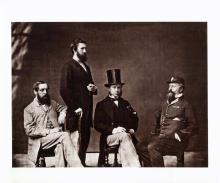Hercules George Robert Robinson, 1st Baron Rosmead, GCMG, PC , was a British colonial administrator who became the 5th Governor of Hong Kong.
On 17 June 1859, aged 35, Robinson was appointed as Governor of Hong Kong, the youngest in Hong Kong colonial history, as which he served until March 1865. On 28 June 1859, he was knighted in recognition of his services for introducing coolie labour into the territory.
During his tenure, Robinson secured the control of the Kowloon Peninsula from the Imperial Chinese Government, thus expanding the size of the territory. Up to this point, the Colony of Hong Kong only consisted of Hong Kong Island. Also, Robinson ordered the construction of the Pokfulam Reservoir, which would provide a steady supply of water for Hong Kong people for years to come. Robinson was also credited with establishing Towngas, the territory's premier gas provider (a position it still holds today), for lighting the streets.
During Robertson's administration, HSBC, along with Standard Chartered, were established in Hong Kong. Both were given the responsibility to print banknotes on the behalf of the Government, a responsibility both banks still hold today.
During his career, Robinson also was Governor of British Ceylon, New South Wales, Fiji, New Zealand, twice of the Cape Colony, and twice High Commissioner for Southern Africa.
On the 10 August 1896, he was raised to the peerage as Baron Rosmead, of Rosmead in the County of Westmeath and of Tafelberg in South Africa.
Source: Wikipedia

Comments
Use of Kowloon
Sir Hercules Robinson's period as governor was also notable for his resistance to the military plans for the use of Kowloon after it was ceded to Britain in December 1860. The military wanted virtually all of the coast and huge tracks of the land for camps, firing ranges, etc. The Governor wanted it to be fairly shared with civilian use. After wrangling about it for a year, the Governor referred the whole matter back to the home Govt. They sat on it for about another year and then sent it back to the Governor to sort out! As a consequence the development of Kowloon got off to a slow start.
The military had of course leased a good part of Kowloon as a tented camp for the Anglo-French forces in the early part of 1860.
Ian